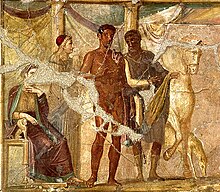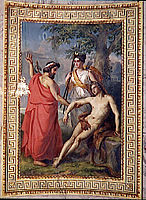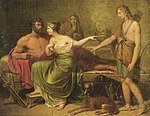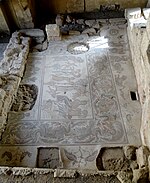| This article needs additional citations for verification. Please help improve this article by adding citations to reliable sources. Unsourced material may be challenged and removed. Find sources: "Hippolytus of Athens" – news · newspapers · books · scholar · JSTOR (December 2008) (Learn how and when to remove this message) |

In Greek mythology, Hippolytus (Ancient Greek: Ἱππόλυτος, romanized: Hippolutos, lit. 'unleasher of horses'; /hɪˈpɒlɪtəs/) is the son of Theseus and an Amazon, either Hippolyta or Antiope. His downfall at the hands of Aphrodite is recounted by the playwright Euripides. Other versions of the story have also survived.

Etymology
The meaning of Hippolytus' name is ironically ambiguous. Ἱππό translates to 'horse', and the element -λυτος (from λύω 'loosen, destroy') suggests the adjective λυτός, -ή, -όν 'which may be undone, destroyed'. His name thereby takes on the prophetic meaning 'destroyed by horses'.
Premise of the myth
Hippolytus is a hunter and sportsman who is disgusted by sex and marriage. In consequence, he scrupulously worships Artemis, the virgin huntress, and refuses to honor Aphrodite. Offended by this neglect, Aphrodite causes Phaedra, Hippolytus’ stepmother, to fall in love with him; Hippolytus rejects Phaedra's advances, setting events in motion that lead to his death in a fall from his chariot.
Hippolytus in Euripides

Euripides' tragedy Hippolytus describes the death of the hero after a confrontation with his stepmother Phaedra, the second wife of Theseus. Cursed by Aphrodite, Phaedra falls so ardently in love with Hippolytus that she becomes physically ill and decides to end her suffering through suicide. Her nurse tries to save her by revealing the secret to Hippolytus and encouraging him to reciprocate. Hippolytus responds only with horror and disgust, humiliating Phaedra. In despair, and not wanting to admit the true reason for ending her life, she hangs herself and leaves a note for Theseus accusing his son, Hippolytus, of raping her. Theseus, furious, uses one of the three wishes given to him by Poseidon, his father: Theseus calls on Poseidon to kill Hippolytus, who has fled the palace to go hunting. Poseidon sends a sea-monster to terrorize Hippolytus' chariot horses, which become uncontrollable and hurl their master out of the vehicle. Entangled in the reins, Hippolytus is dragged to death. Artemis reconciles father and son by telling Theseus that Phaedra's accusation against Hippolytus was not true. Artemis comforts the dying Hippolytus with a promise to make him the subject of religious practice so that his memory will live forever. She assigns a band of Trozenian maidens the task of preserving the story of Phaedra and Hippolytus in a ritual song.
Versions of this story also appear in Seneca the Younger's play Phaedra, Ovid's Metamorphoses and Heroides, and Jean Racine's Phèdre.
Hippolytus as Virbius and his afterlife

Virbius was one of two figures associated with the ancient cult of Diana Nemorensis, the other being Egeria. The nature of his function there remains enigmatic. During a later phase of Hellenization, Virbius was assimilated to the Greek Hippolytus, as a metamorphosis.
The version presented by Ovid in Metamorphoses, and by Pausanias, relates a story about Hippolytus that differs from the version presented by Euripides.
Hippolytus was resuscitated by Asclepius; once revived he refused to forgive Theseus, went to Italy, became the king of the Aricians, and named a city after Artemis. He ruled as "Virbius" from inside the shrine of Diana. (The sanctuary forbade horses from entering, which is why it is believed he lived there.) This story of Hippolytus differs from Euripides' version, in that it brings Hippolytus back from the dead to live his life in Italy, while Euripides permanently connects him to his tomb. Virbius was also identified with the sun god Sol/Helios (Phaedra's grandfather).
As a result, a cult grew up around Hippolytus, associated with the cult of Diana. His cult believed that Artemis asked Asclepius to resurrect the young man since he had vowed chastity to her. Followers of Hippolytus' cult cut off a piece of their hair to dedicate their chastity to him before marriage.
Gallery
-
 Esculape rend la vie à Hippolyte by Abel de Pujol
Esculape rend la vie à Hippolyte by Abel de Pujol
-
 Hippolytus, Phaedra and Theseus. German School, 18th century
Hippolytus, Phaedra and Theseus. German School, 18th century
-
 Part of the mosaic of Hippolytus in the Archaeological Park of Madaba, Jordan
Part of the mosaic of Hippolytus in the Archaeological Park of Madaba, Jordan
-
 Hippolytus set – Seuso Treasure
Hippolytus set – Seuso Treasure
See also
References
- ^ Virgil; Ahl, Frederick (October 2007). Aeneid – Virgil – Google Boeken. Ebsco. ISBN 9780191517785. Retrieved 2013-10-16.
- Frazer, James. The Golden Bough (Chapters 1–2, particularly)
- ancientadmin. "Hippolytus – Euripides – Ancient Greece – Classical Literature". Ancient Literature. Retrieved 2020-10-28.
- ancientadmin. "Hippolytus - Euripides - Ancient Greece - Classical Literature". Ancient Literature. Retrieved 2020-10-21.
- Rice, Bradley N. (2017-03-31). Tappenden, Frederick S.; Daniel-Hughes, Carly (eds.). Coming Back to Life: The Permeability of Past and Present, Mortality and Immortality, Death and Life in the Ancient Mediterranean (2 ed.). McGill University Library. pp. 345–374. doi:10.2307/j.ctvmx3k11.20. ISBN 978-1-77096-222-4. JSTOR j.ctvmx3k11.
- ^ Coming back to life : the permeability of past and present, mortality and immortality, death and life in the ancient Mediterranean. Daniel-Hughes, Carly, 1974–, Tappenden, Frederick S,, Rice, Bradley N,, Coming Back to Life: Performance, Memory, and Cognition in the Ancient Mediterranean (Conference) (2014 : Montréal, Québec). Montréal, QC. 2017. ISBN 978-1-77096-222-4. OCLC 975051675.
{{cite book}}: CS1 maint: location missing publisher (link) CS1 maint: others (link) - Georges Dumézil, la religion romaine archaïque, Payot 1974 p.410.
- Ovid. Metamorphoses, Book XV.
- Servius, Commentary on Virgil's Aeneid 7.776
- Fontenrose, Joseph Eddy (1981). Orion: The Myth of the Hunter and the Huntress. University of California Press. p. 199. ISBN 0-520-09632-0.
- Waldner, Katharina; Rice, Bradley N. (2017). "Hippolytus and Virbius". In Tappenden, Frederick S.; Daniel-Hughes, Carly (eds.). Hippolytus and Virbius:: Narratives of "Coming Back to Life" and Religious Discourses in Greco-Roman Literature. The Permeability of Past and Present, Mortality and Immortality, Death and Life in the Ancient Mediterranean (2 ed.). McGill University Library. pp. 345–374. doi:10.2307/j.ctvmx3k11.20. JSTOR j.ctvmx3k11.20. Retrieved 2020-12-09.
{{cite book}}:|work=ignored (help)
External links
 Media related to Hippolytus at Wikimedia Commons
Media related to Hippolytus at Wikimedia Commons- Hippolytus for details on the figure of Hippolytus and a classicist's philological study of the evolution of Hippolytus as a chastity paradigm in Euripides, Seneca, Racine; extensive bibliography (in Dutch)